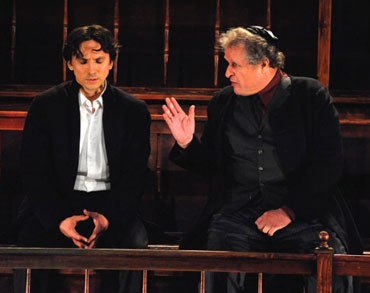Who over 30 hasn't thought at some point that know-it-all twentysomethings -- lounging in their skinny jeans, tweeting about their favorite CW shows -- will surely be the downfall of civilization as we know it? It happens, you roll your eyes and sigh audibly, and life goes on.
But man, back in 17th century Amsterdam, the oldsters just couldn't let it drop. Let word get out that some 23-year-old wannabe-philosopher is questioning the nature of God and the universe, and bam, they're all over him like icing on a Georgetown Cupcake, pushing his faith community to excommunicate him before a more sinister fate befalls him.

New Jerusalem
(Photo by Stan Barouh)
It's been less than two years since Theater J dived into this milieu with New Jerusalem: The Interrogation of Baruch de Spinoza, but David Ives's portrait of a city and a citizen in crisis proved so popular that the company has brought it back for a month-long run. The appeal is obvious: sharply crafted language that brings lofty ideas down to earth, brisk pacing by director Jeremy Skidmore and a star turn by Alexander Strain that makes Spinoza far more likable than threatening.
Yet threatening he is to the Christian leaders of Amsterdam in 1656, a time when Portuguese Jews like Spinoza are enjoying a peaceful, though intensely regulated, haven from the terrors of the Spanish Inquisition. Civic spokesman Valkenburgh (Lawrence Redmond) boasts of Amsterdam's tolerance, claiming that the city is, in essence, the New Jerusalem of biblical prophecy. But at the same time, he is pressuring leaders of Spinoza's congregation, Rabbi Mortera (Michael Tolaydo) and elder Ben Israel (Michael Kramer), to eject Spinoza with the harshest form of excommunication possible.
As his day of reckoning unfolds at the congregation, Spinoza thinks that he has an ally in his friend Simon (Brandon McCoy), but Simon is soon revealed to have connections and motivations that belie their bond. A family member, half sister Rebekah (Colleen Delany), has shown up, but only to berate him over issues like his inheritance from their father. And while he does have the devotion of a young woman, Clara (Emma Jaster), he's been seeing, her Christianity makes their relationship problematic to a government that won't permit Jews and Christians to discuss religion, much less marry.
''Atheist'' is the condemning label that Valkenburgh wants applied to Spinoza, despite the fact that he eloquently defends himself as a believer in God, albeit one with radical ideas about where and what God is. And so the action propels toward the foregone conclusion of historical record -- that Spinoza was excommunicated and went on to be both revered for his philosophy and reviled by those whose faith can't withstand questioning.
The script by Ives, who has been a Washington staple of late with works such as The Heir Apparent at the Shakespeare Theatre Company and Venus in Fur at Studio Theatre, is stronger in its lovely articulation of Spinoza's intellectual concepts than it is in dramatic construction. The character of Valkenburgh is rarely more than a mustache-twirl shy of a stereotypical Snidely Whiplash villain, though Redmond clearly has the gravitas to convey deeper levels, were they provided.
Simon, Rebekah and Clara are crafted in a similarly superficial vein that makes them less compelling than they could be, although Clara does have a memorable moment (in a too-understated performance by Jaster) when she conveys the overwhelming, life-altering impact of all the new ideas Spinoza has introduced her to.
NEW JERUSALEM

 1/2 To April 1 Theater J 1529 16th St. NW $25-$60 800-494-TIXS theaterj.org
1/2 To April 1 Theater J 1529 16th St. NW $25-$60 800-494-TIXS theaterj.org
Then again, it does go to show that it's really all about Spinoza's time to shine (and sweat) in the spotlight. Strain's performance movingly conveys the sometimes wavering confidence of a brilliant young man who knows that he doesn't have all the answers but is determined to find them eventually, regardless of the cost. And the cost is no more apparent than in the push and pull with Tolaydo's Rabbi Montera, who clearly cares for Spinoza and would perhaps even celebrate his brash intellect if not facing such pressure to crush it.
Alas, the Amsterdam of Spinoza's time fell short of the shining city of the play's title, but it's ultimately a worthy destination that bears revisiting.
...more